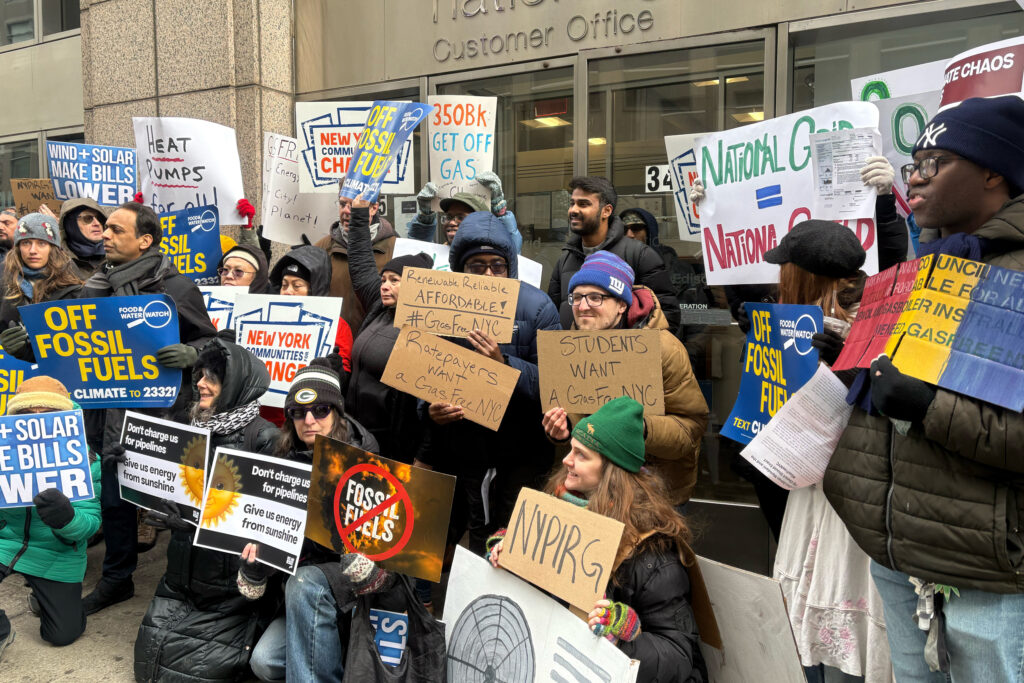A growing effort by the fossil fuel industry to sell natural gas as a low-carbon fuel is little more than greenwashing, according to a new report by climate advocacy organizations.
Gas producers looking to differentiate their products as clean fuel are increasingly seeking “gas certification” from third-party companies, which monitor wells and other gas infrastructure for climate-wrecking methane emissions.
However, gas certification is an unregulated industry. The monitoring systems companies employ routinely miss the methane they were designed to detect, according to a June 18 report by Oil Change International and Earthworks.
“Certified gas is a greenwashing scam,” said Dakota Raynes, a researcher with Earthworks and an author of the report. “There is not nearly enough evidence from the certifiers or the oil and gas industry itself that this gas is actually indeed [associated with] lower methane emissions.”
We’re hiring!
Please take a look at the new openings in our newsroom.
See jobs
Project Canary, one of the leading emissions monitoring companies offering low-methane certification to oil and gas companies—and a primary focus of the report—contested the findings. The firm said it was not certifying any of the sites included in the report, which it said “contains numerous inaccuracies and mischaracterizations.”
Gas certifications have wide-ranging implications that go far beyond the bragging rights of individual gas producers.
Methane, the primary component of natural gas, has a lower climate impact than coal or oil when burned. However, it is also a highly potent greenhouse gas—more than 80 times worse than carbon dioxide over a 20-year period—if it leaks or vents into the atmosphere instead.
Project Canary and two other companies—Equitable Origin and MiQ—provide certifications for nearly 40 percent of all gas produced in the United States, according to the report. Gas utility companies have begun selling certified gas and charging ratepayers a premium for it.
Arvind Ravikumar, co-director of the Energy Emissions Modeling and Data Lab at the University of Texas at Austin, who was not involved in the report, said the continuous monitors employed by gas certification companies are “the holy grail” of methane emissions detection. Ravikumar said the devices work well in controlled settings but cautioned that the technology is still in its early stages of development and may not meet the same performance standards when deployed in the field.
The June report was based on 81 surveys by Earthworks of 38 different oil and gas production sites where gas certification companies had deployed continuous monitoring equipment. Using a type of thermal camera known as optical gas imaging (OGI), Earthworks detected 23 pollution events.
Earthworks and Oil Change International then filed public record requests with the state of Colorado to see if the same pollution events had been detected by the gas certification companies. With the exception of one such event, the answer was no, according to the report.
Twelve of the 23 emission events documented by Earthworks occurred at sites with Project Canary monitors, only one of which was detected by Project Canary, the report said. The environmental groups also noted that Project Canary’s monitors were down, or inoperable, 26 percent of the time over an 11-month period.
But company officials said their sensors weren’t deployed to detect methane emissions and that “none of the sites referenced in the report were ever certified by Project Canary.” The company’s monitors at those locations detected volatile organic compounds (VOCs). VOC detection is often used as a proxy for methane detection as emissions from oil and gas wells typically contain a mix of each.
Colorado state regulations require oil and gas producers to monitor new wells for “hydrocarbon emissions” during pre-production and early production stages of operation, but allow operators flexibility in which pollutants they monitor.
Project Canary posted its response to the report online. The company said it detected seven of the 12 emissions events but under state laws were required to report only one to regulators.
The company conceded that three of the events Earthworks detected occurred at times when sensors required maintenance. However, Project Canary said one event occurred a month after the company removed its monitors, given that state regulations require monitoring at new well sites only during pre-production and the first six months afterward.
Ravikumar of the University of Texas noted concerns both with the report and the emissions monitoring systems it scrutinized.
“This is nowhere near a random sample,” Ravikumar said of the 38 sites that the environmental groups focused on. A scientific study published in a peer-reviewed journal would typically assess oil and gas facilities that were selected at random.
“They chose sites that are more likely to have emissions,” Ravikumar said, noting that the locations were subject to air quality monitoring and reporting requirements. “Not all sites are subject to those requirements. So by definition, they chose sites that are more likely to have emissions.”
Earthworks’ Raynes responded that all new oil and gas extraction sites in Colorado are subject to air quality monitoring and reporting requirements under Regulation 7. However, Earthworks and Oil Change International noted in their report that they “prioritized surveys of oil and gas sites where we can assist communities in documenting concerns or exposing possible compliance issues.”
“At no point do we claim this is a random sample and it is impossible for us to have a priori knowledge of which sites are more likely to have emissions,” Raynes said. “The assertion that we selectively chose sites more likely to have emissions is not accurate.”
As for Project Canary, Ravikumar said that, based on the report, at least two of the included sites with Project Canary sensors had sound walls—30-foot tall barriers—between the company’s monitors and the oil and gas wells they were monitoring. Such a setup could result in missed emissions, he said.
It is “hard to tell the distance between the sound wall and the sensor, but in general, the plume has to pass over the sensor for a detection,” Ravikumar said. “Based on the images here, that does not seem likely.”
A spokesperson for Project Canary told Inside Climate News that their monitors were used to detect whether VOCs were emanating from the site into the surrounding community and the location of their monitors was appropriate for that purpose.
A group of seven Democratic senators led by Ed Markey of Massachusetts wrote to Federal Trade Commission Chair Lina Khan in February, calling on the FTC to “investigate and crack down on unfair and deceptive environmental claims made by fossil fuel producers and gas certification programs.”
“So-called third-party ‘certified gas’ is one of the most prominent forms of deception—it’s the same old gas with a sparkly new label.”
Citing a prior report from Earthworks and Oil Change International, the senators noted that certified gas harms consumers who pay a higher price for a commodity that may not be as clean as its producers claim.
“Utilities in Massachusetts, New York, Vermont, New Jersey, Michigan, Colorado, and Virginia have purchased or plan to purchase certified natural gas at premium rates and have received or sought approval to pass those costs—ranging from tens to hundreds of thousands of dollars a year—onto consumers,” the letter noted, citing work by the Revolving Door Project, a government watchdog organization.
In a letter to Markey in May, Khan said the FTC is currently reviewing its “Green Guides” governing environmental marketing claims.
“I’m glad the FTC is taking our concerns about certified gas seriously,” Markey said in a written statement. “So-called third-party ‘certified gas’ is one of the most prominent forms of deception—it’s the same old gas with a sparkly new label.”
Ravikumar said sensor performance needs to improve for gas certifications to be effective.
This story is funded by readers like you.
Our nonprofit newsroom provides award-winning climate coverage free of charge and advertising. We rely on donations from readers like you to keep going. Please donate now to support our work.
Donate Now
“This will only work if certifications are trusted and stakeholders—that’s the public, the regulators and even the industry—believe that these certifications have value,” he said.
The alternative, Ravikumar cautioned, is that gas certifications lose that value. That’s what has happened with carbon offsets when projects that claimed to reduce emissions didn’t achieve their goals.
“We have to avoid the pitfalls of the carbon offset markets that we have seen where now this offset market is junk,” he said. “It’s not worth anything because people don’t trust the offset numbers.”
He added: “What’s most important in certification is trust. Everything else comes after that.”

















